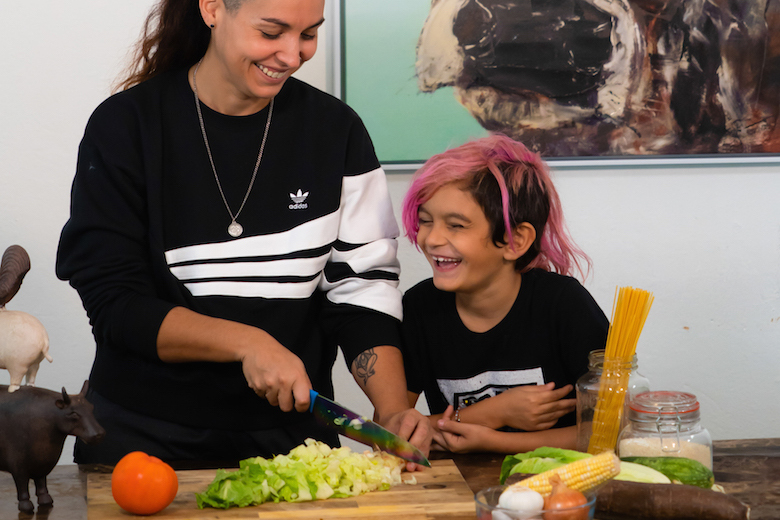
In a monthly column, Leah Kirts covers the work of queer organizers expanding food justice through mutual aid across New York City and beyond.
Chilis on Wheels was born out of burnout. The volunteer-run nonprofit makes veganism accessible to underserved communities with chapters across the U.S. and its colonies. Michelle Carrera, a 39-year-old queer vegan Puerto Rican activist based in Brooklyn, says she unknowingly founded the organization in a moment of political and personal exhaustion.
In 2014, following months of local protests in New York City against the Ferguson police killing of Michael Brown, Carrera wanted to do something that felt positive. She couldn’t find a soup kitchen in the city that served vegan meals, so she made a batch of chili in her small apartment kitchen, packed it into a wheeled cart and walked through the deserted streets of Union Square on Thanksgiving Day with her then-4-year-old son, Ollie, handing out meals and talking to people. “I thought, We have to do this again,” she recalls.
Once a month, they began setting up in Tompkins Square Park to share food with passersby which attracted friends and volunteers to join them. Groceries stores and vegan restaurants began donating food. And from there, it grew.
“I didn’t set out to start an organization. I just wanted to support and build up my community through food,” says Carrera, who has also experienced periods of food insecurity. “I wasn’t outside of my community fighting for it, I was inside it. And that’s the beauty of mutual aid. We bring what we have, we come together, and we all come out empowered.”
Veganism radicalized Carrera in her early 20s around human injustice and charted her course in community-centered work. And it all started with a chicken. Her sister received a chick for Easter who became a rooster. “He answered to his name and liked to cuddle,” Carrera tells me. “I saw him as a person and couldn’t eat any more animals after that.”
Through animal rights, Carrera became more aware of how people are marginalized by the same systemic inequality that harms animals. Still today, there is a disappointing lack of solidarity in mainstream veganism with movements on the left like immigrant rights, Black Lives Matter, queer & trans liberation, and farm labor rights. “It’s important to situate veganism and non-human liberation within the larger framework of oppression, and realize that all oppressions have to be fought collectively,” says Carrera.

In 2017, when Hurricane Maria struck, Carrera returned to Puerto Rico and helped organize disaster relief. Seeing the need for a permanent presence on the island, she established Casa Vegana de la Communidad in San Juan, which serves as Chilis on Wheels’ headquarters, a community center and microsanctuary for two chickens rescued from slaughter.
Being grounded in San Juan enabled volunteers to quickly mobilize during the ongoing marches against the Puerto Rican government. Years of organized protests against state corruption and mismanagement were amplified when leaked chats of cabinet members revealed intense homophobia, misogyny, and mockery of the 4,645 Puerto Ricans who died due to government negligence after Hurricane Maria.
“This is a country that didn’t have electricity for a whole year after the hurricane,” Carrera explains. “They suffered through day-long lines for gas, empty supermarket shelves, and had to bury their dead, sometimes with their own hands, because there were no services in the aftermath of the storm.” Conditions for revolution have been simmering for decades before this summer, Carrera continues, but one thing is clear, “the people aren’t afraid anymore.”
From her vegan co-op house and urban microsanctuary in Bushwick, Carrera organizes resources to support people on the ground in Puerto Rico. They distribute supplies to protect protesters from tear gas, and prepare food—fresh salads to cool off and sandwiches to satiate—in collaboration with Peace and Loaf, a vegan pizzeria, and Veganizalo, a vegan pop up and community partner. Volunteers, who are also protestors, hold up signs advertising free water and vegan sandwiches amidst the crowds that are noticeably young, working-class and queer.
“As a vegan queer Puerto Rican, it is unfathomable for me to have to pick a side between my own liberation and that of non-human animals,” says Carrera. “So I fight for both. I fight for all. Because colonialism and capitalism oppress us all. Serving vegan food in protests is an extension of this fight.”
At the same time halfway around the globe, Chilis on Wheels chapters in Honolulu and Maui are providing support to Native Hawaiian land protectors who are blocking the construction of a thirty meter telescope on Mauna Kea. In Hawai’i as in Puerto Rico, volunteers go beyond weekly communal meal shares to replenish water and distribute food for those on the frontlines, including themselves.
What sets this type of organizing apart is the lack of hierarchies that push people into static roles as “people who are helping” and “people who are being helped,” leading to isolation and chronic burnout. Mutual aid, however, redefines what it means to work for the collective good while supporting individual well-being. Food, as much as it is sustenance, is an entrypoint to relationships that build communities organized around people’s needs, ensuring they have a stake in the revolution.
“It’s funny, when we’re young we’re told that we will become less radical as we grow older, but I have found the opposite to be true,” says Carrera. “Every day, I become less and less apologetic about the need to fight these systems.”



